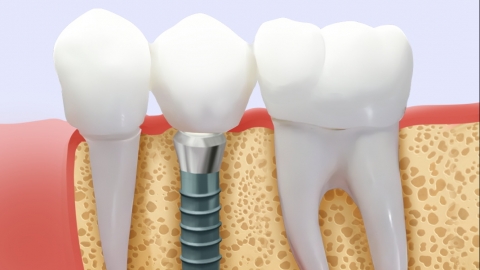What are the post-operative care instructions after dental implant surgery?
Generally speaking, tooth planting refers to dental implantation. After dental implantation, attention should be paid to dietary adjustments, maintaining oral hygiene, avoiding irritation to the wound, following medical advice regarding medication and follow-up visits, and managing facial swelling. Dental implants involve surgically placing an artificial tooth root into the jawbone at the site of the missing tooth. Once the implant forms a strong osseous bond with the jawbone, an abutment and crown are installed to restore the tooth's shape and function. The general reference price for dental implants ranges from 3,000 to 20,000 yuan per tooth. Improvement is typically noticeable 3-6 months after surgery, although symptoms such as hematoma and infection may occur. A detailed explanation is as follows:

1. Dietary Adjustments
In the short term after surgery, avoid eating overly hard, hot, or sticky foods. Hard foods may place excessive pressure on the implant, affecting its initial stability; hot foods can dilate local blood vessels, increasing the risk of bleeding and swelling; sticky foods tend to adhere to the wound or crown, which is unfavorable for oral cleanliness and may pull on the wound, interfering with the healing process.
2. Maintain Oral Hygiene
Avoid brushing and rinsing for the first 24 hours after surgery. Afterward, use a soft-bristled toothbrush to gently brush teeth, avoiding the surgical area. Keeping the mouth clean is crucial for preventing infections around the implant.
3. Avoid Irritating the Wound
Do not lick the wound with your tongue or suck on it after surgery, as this may dislodge the blood clot, leading to bleeding or bacterial invasion. Additionally, avoid strenuous activities and external impacts to the implant area to reduce effects on the implant's stability.
4. Follow Medical Advice on Medication and Follow-up
Take antibiotics and other medications as prescribed by your doctor to prevent infection, such as cephalosporin antibiotics. Regular follow-up visits are necessary; typically, check-ups are required one week, one month, and three months after surgery. The doctor can monitor the healing of the implant and wound recovery, promptly identifying and addressing issues like infection or implant loosening to ensure successful implant restoration.
5. Pay Attention to Facial Swelling Care
Facial swelling may occur after surgery and can be managed with cold compresses within the first 24 hours to constrict local blood vessels, reducing bleeding and swelling. After 48 hours, apply warm compresses to promote blood circulation and absorption of tissue fluid, alleviating swelling. However, be mindful of the temperature and duration during cold and warm compresses to avoid frostbite or burns, which helps reduce postoperative discomfort and accelerates the return to normal facial appearance.
It is recommended to visit a reputable hospital and perform the above procedures under the guidance of a qualified physician to ensure the safety and stability of the surgery.





